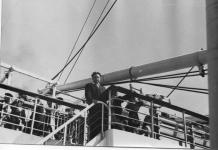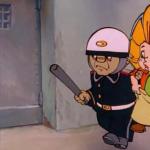The death of the Titanic after a collision with an iceberg in 1912 became a symbol of all major maritime disasters that occurred in peacetime for decades to come. By the end of the 20th century, people again began to have the illusion that tragedies of this kind had become history. The retribution for such delusions is always cruel.
On August 31, 1986, a disaster occurred in Tsemes Bay near Novorossiysk, which later became known as the “Soviet Titanic.” But, unlike the story of 1912, in this case there was no iceberg - the collapse was entirely the work of human hands.
Trophy "Berlin"
The Soviet cruise ship Admiral Nakhimov was launched in March 1925 in Lobbendorf, Germany, receiving the name Berlin. In the early years of its existence, the Berlin flew from Germany to New York. By the end of the 1930s, transatlantic flights became unprofitable, and the ship was transferred to cruises in the Mediterranean.
With the outbreak of World War II, the Berlin was converted into a hospital ship and was used as such until 1945. In January 1945, it hit a mine near the port of Swinemünde and sank at shallow depths. In 1947, the ship was raised by Soviet divers and sent to the docks of the Kronstadt port for partial repairs. The steamship that became a trophy received a new name - “Admiral Nakhimov”, after which it went to its homeland, Germany. In the GDR, the ship underwent a major overhaul and in 1957 became part of the Black Sea Shipping Company."Berlin", 1920s. Photo: Commons.wikimedia.org
Prestige holidays and special operations
“Admiral Nakhimov” became in the USSR a symbol of a prestigious cruise vacation, hitherto unknown to Soviet citizens. However, sometimes it was used for other purposes. Thus, during the Cuban missile crisis, Soviet military personnel were transferred to Cuba on board, and in 1979, Cuban military personnel were transferred to carry out a secret mission in Africa.
In the history of “Admiral Nakhimov” there were flights with pilgrims to Saudi Arabia, and sailing with participants of the World Festival of Youth and Students. The steamship had an exceptional reputation - for almost three decades of its operation in the USSR, not a single serious incident was recorded with its participation.Time, however, made itself felt - in the 1980s, Admiral Nakhimov replaced long-distance flights with cruises on the Black Sea. These cruises were wildly successful among the unspoiled residents of the USSR.

The promenade deck of the Admiral Nakhimov in 1957. Photo: Commons.wikimedia.org
Flight Odessa - Batumi - Odessa
On August 29, 1986, “Admiral Nakhimov” went on its next voyage along the route Odessa - Batumi - Odessa with calls to Yalta, Novorossiysk and Sochi. The cruise was supposed to end on September 5. Having left Odessa, the ship safely reached Yalta, and then at 14:00 on August 31st arrived in Novorossiysk. At 22:00 the liner was supposed to leave the port and head for Sochi. There were 1,243 people on board: 346 crew members and 897 passengers.
Captain of the Admiral Nakhimov since 1984 Vadim Markov, an experienced sailor who had work on foreign shipping lines behind him. Captain Markov knew his ship very well, and leaving the port did not promise any dangers.
According to a message from the ship traffic control post (VDR), at that moment the only ship approaching the port of Novorossiysk was the dry cargo ship Pyotr Vasev, carrying Canadian barley. The cargo ship was commanded by a captain Victor Tkachenko, who said that he would allow the steamer leaving the bay to pass.“Peter Vasev” is meeting halfway
With a delay of 10 minutes from the schedule, the Admiral Nakhimov unmoored and rushed to the exit from the port. The steamer passed the port gates, set a course of 154.2 and began to follow the direction of the Penay Banks buoys, which were located at the exit from the bay.
There was calm on board. Some of the passengers went to bed, some were going to a movie show, young people were at a disco in the music salon, some people were in bars.
At this time, Captain Tkachenko once again confirmed that “Pyotr Vasev” would allow “Admiral Nakhimov” to pass. Tkachenko transmitted the same information via radio to the second mate of the Admiral Nakhimov. Alexander Chudnovsky, who at 23:00 took over the watch from Captain Markov. Tkachenko and Chudnovsky agreed that the ships would pass on their starboard sides. Captain Tkachenko relied on the readings of the ARPA - an automated radar course plotting system. The data from this device indicated that the ships would disperse safely.
But Chudnovsky, who was on the Admiral Nakhimov and observed the situation visually, discovered at approximately 23:05 that the ships were moving dangerously close. The watchman again contacted Tkachenko, clarifying: “Pyotr Vasev” is definitely letting the steamer through? Captain Tkachenko confirmed: yes, everything is fine.

"Peter Vasev." Photo: Commons.wikimedia.org
“Work back immediately!”
Meanwhile, on the Pyotr Vasyov there were those who saw that the situation was developing in a dangerous direction. Mate Zubyuk drew Tkachenko's attention to the fact that the bearing on the Admiral Nakhimov practically does not change, which indicates that there is a threat of collision. At the same time, Zubyuk pointed to the lights of the steamer, indicating that the ships were approaching a collision.
Captain Tkachenko looked only at the device for several more minutes with inexplicable stubbornness. And only then, finally looking at where Zubyuk was pointing, I realized with horror that the “Pyotr Vasev” was flying at high speed straight towards the “Admiral Nakhimov”.Captain Tkachenko began to give commands to the engine room - “medium forward”, “small forward”. These half measures no longer helped, and Tkachenko’s last command was: “Stop, go all the way back!” However, a heavy cargo ship cannot change direction instantly. "Pyotr Vasev" continued to go towards "Admiral Nakhimov". On the ship, the captain's assistant on the watch, Alexander Chudnovsky, radioed to the cargo ship: “Work back immediately!” The helmsman of the Admiral Nakhimov was given the command: “Left aboard!”
"Nakhimov" sank to the bottom in 8 minutes
This did not help - at 23:12 a collision occurred. "Pyotr Vasev" at a speed of 5 knots entered the middle of the starboard side of the steamer at an angle of 110°. In the underwater part, the bulk carrier entered with its protruding part, the bulb, several meters into the hull of the Admiral Nakhimov in the area of the bulkhead between the engine and boiler rooms. The Admiral Nakhimov continued to move forward by inertia, turning the cargo ship around and thereby increasing the size of the hole in the starboard side, which eventually amounted to about 80 square meters.
A huge hole led to the rapid flooding of the ship. In just 30 seconds, the engine room was filled with water. The ship began to fall to starboard. The emergency lighting, which turned on to replace the main one that had turned off, only worked for two minutes. Many people were trapped in cabins inside the sinking ship. All the team members managed to do was launch the inflatable rafts. 8 minutes after the collision, at 23:20, the Admiral Nakhimov sank under the water, leaving hundreds of people fighting for their lives on the surface. Among them there was no assistant captain Alexander Chudnovsky. The sailor, realizing that the ship was dying, pronounced a death sentence on himself - going down to his cabin, he locked himself in it and, together with the Admiral Nakhimov, sank to the bottom.
More than 60 ships rescued the dying people
The first to approach the scene of the disaster was a small pilot boat LK-90, heading to the “Peter Vasev” to escort it to the pier. "Admiral Nakhimov" sank in front of the boat's crew members.
At 23:35 LK-90 began rescuing people. 118 people were lifted aboard the small vessel, which is significantly more than the permissible load. Then the rescued people began to be transferred to other ships that approached. At this time, the captain of the port of Novorossiysk, Popov, gave the order to all watercraft to proceed to the disaster area to save people. Tugs, small and raid boats, border troops boats, hydrofoil comets - a total of 64 vessels took part in the rescue operation.
We had to work in difficult conditions - strong winds, waves up to two meters. But the sailors did everything possible and impossible. The cadets of the Novorossiysk Higher Naval Engineering School, alerted, went to sea in skiffs, risking their own deaths.
The crew of the dry cargo ship “Pyotr Vasev” also took part in the rescue operation, bringing 36 people on board. Of the 1,243 people on board, 423 died: 359 passengers and 64 crew members. Among the dead were 23 children.
Who is guilty?
A large government commission headed by the first deputy chairman of the Council of Ministers of the USSR arrived from Moscow Heydar Aliyev, and with it a large investigative team.
In the end, both captains went to trial - Viktor Tkachenko and Vadim Markov received 15 years in prison. Markov, who miraculously survived the disaster, was blamed for his absence on the bridge. At the time of the disaster, the captain was in the cabin of the head of the KGB department for the Odessa region, Major General Krikunova, where he was invited to dinner. Unlike Markov, General Krikunov died along with his family.
For thirty years, in the disaster of the Admiral Nakhimov, who and what was blamed - the anomalous zone, the Soviet system, the dilapidation of the ship, and saboteurs... The story about the ordinary “human factor” grated on the ears of many. "Admiral Nakhimov" took two more human lives after the crash - two divers died while lifting the bodies of the victims to the surface. After this, work on the ship was stopped, and the bodies of 64 people remained inside the hull of the Admiral Nakhimov.
The captain of the Peter Vasyov went to Israel and died in a shipwreck.In 1992, after the collapse of the USSR, the presidents of Russia and Ukraine pardoned the convicted captains.
After his release, Vadim Markov returned to Odessa and worked at the Black Sea Shipping Company as a captain-mentor. Due to persecution from relatives of the victims, his family had to change their place of residence several times. In 2007, the captain of the Admiral Nakhimov died of cancer.
The captain of the Peter Vasyov, Viktor Tkachenko, taking his wife’s surname, Talor, moved to Israel for permanent residence, hoping that there the story of the death of the Admiral Nakhimov would no longer interfere with his life. In 2003, a yacht captained by Victor Tallor crashed off the coast of Newfoundland. The wreckage of a yacht and the remains of people were found on the coast of Canada.
The area of Tsemes Bay, where the Admiral Nakhimov lies at a depth of 47 meters, is officially the burial place of the victims of the disaster. Anchoring, diving by divers and submersibles, as well as any actions that disturb the peace of the burial site are prohibited in the specified area.
We have been waiting for a long time for the appearance of a female sea captain in Primorye. After the departure of the legendary Anna Shchetinina from the captain's bridge, he remained without female supervision for almost half a century. And then it happened. Last year, the motor ship "Captain Kirichenko"

We have been waiting for a long time for the appearance of a female sea captain in Primorye. After the departure of the legendary Anna Shchetinina from the captain's bridge, he remained without female supervision for almost half a century. And then it happened. Last year, the motor ship "Captain Kirichenko", under the command of sea captain Tatyana Sukhanova, sailed from Vladivostok through the Pacific, Indian and Atlantic oceans. The crew worked under overload for six months in the Falkland Islands and off the coast of South America.
Spring in the Atlantic
Spring in the Atlantic is very similar to late autumn in the Sea of Okhotsk - storms catch up with one another, strong winds and rains. On that voyage, it seemed that all thirty-three misfortunes fell on the crew at once - perhaps to give a real sea baptism to this short, thin, blue-eyed 36-year-old woman who decided to conquer the oceans.
The main engine “flew” in the Strait of Malacca. On the way to Singapore, they were hit by another storm and damaged the GPS antenna - one might say, they were heading almost according to the stars.
It wasn't just the mechanisms that broke down. The navigator fell ill, the chief mechanic had a heart attack, the carpenter injured his arm and was operated on in one of the ports, and to top it all off, on a stormy night, a barrel of engine oil spilled onto the deck, and the crew glided along the deck as if on skates... The entire crew was overloaded he worked in the holds and it happened that Tatyana stood watch on the bridge for several days in a row. When troubles like this happen, everyone is in full view. They say that after such harsh tests, true friendship emerges.
...At a meeting of the Far Eastern Association of Sea Captains, of which Tatyana Sukhanova is a member, they discussed the nuances of her first captain's voyage. This kind of “debriefing”, when captains exchange opinions on extreme cases at sea, is a common thing here. Tatyana Anatolyevna was nervous before the conversation, like a schoolgirl. But Tatyana values the opinion of experienced colleagues, among whom are such absolute authorities of the navy as captains Abonosimov, Pudovkin, Cherepanov, Podshivalov, Osichansky.
The old “sea wolves” delivered their verdict unanimously: well done, Tatyana. She did everything right.
Woman and sea
“Where is everything taking them, these women? There will soon be no fewer of them driving cars than men. Well, why does she need to be a captain? Anna Shchetinina’s laurels did not allow you to sleep peacefully?” - I hear the grumbling of adherents of women’s destiny according to the husband-kitchen-children scheme.
As for the famous Anna Shchetinina, Tanya Sukhanova, whose childhood was spent in a small village in the Khabarovsk Territory, heard about her only at the maritime school. Did you go to sea for romance?
“Partly yes,” says Tatyana. “But the main thing is that traditionally female professions, such as a doctor or a teacher, seemed very boring. I wanted to test myself in something harsh and unusual.
Well, of course, it was her character that brought her to the sea, not an accident. In childhood and adolescence, I managed to combine studies in three schools at once - regular, sports and music. She continued to engage in sports and amateur performances as a student and into adulthood.
The desire for speed is probably in her blood - at first she rode a motorcycle - on a red Voskhod in a red helmet, happy and free, like a bird in flight. There were no rights, dad was tired of paying fines from his salary as a geologist. As soon as Tanya turned 16, he said: “Get your license, daughter, otherwise you will completely ruin us with your fines.” At the age of 16, she took courses and received a motorcycle license, and at 18, a car license.
After school, having sent inquiries to the navigation departments of all “water” universities in the country, she received a polite refusal: we do not accept girls. Only the river command school in Blagoveshchensk did not give her a spanking based on her gender. She was the only girl in the group and even then she realized that to fulfill her dream, she would only need to be the best - in studies, in sports, and in any activity. So as not to hear the condescending voice behind you: “A woman has no place in the navy...”.
Of the 117 cadets who entered with her, 18 received diplomas, of which only four are now working “on the water.” And only Tatyana Sukhanova from the entire graduating class, who, by the way, graduated from college with honors, stood on the captain’s bridge of a sea vessel.
She worked for five years at the Amur River Shipping Company - as a sailor, motor mechanic, then for another three years as the third navigator on the passenger ship "Georgy Sedov". I managed to do everything: studied by correspondence, played sports, sang in an ensemble...
She will meet ironic smiles more than once on the way to her dream. Over the years, she will learn not to pay attention to them, proving with her work, endurance, perseverance, and strength of character that she, Tanya Sukhanova, does everything she undertakes “excellently.”
She completed six correspondence courses at FEVIMU in four years. She gained experience on Vostoktransflot ships, then worked at the Rimsko company. Already as a first mate she came to Dalrifer, and after four years of the first mate's shift at sea, she took her first captain's voyage on the ship "Captain Kirichenko". Now Tatyana Sukhanova is on vacation, she has seriously improved her English in courses and is ready to go on a flight again.
...Well, tell me, who of the men could tame such a brave, obstinate and pretty? But, as the poet said, “the time has come, she fell in love...”.
Tatyana and Alexey's son Alyosha is growing up. In raising her son, the mother adheres to the rule: the man is the master of the house, and he makes the main decisions on the family ship. And she is in the house - a loving wife and mother.
First person
Tatyana Sukhanova, sea captain:
I think that you should always take your chance in life. I know for sure that grievances and all the bad things are quickly forgotten.
Although it is strange that in any port in the world I, a female captain, was greeted much more welcomingly than in my native country. Even my friend from Arkhangelsk, sea captain Ekaterina Nemirova, as well as the famous captain Lyudmila Tibryaeva and female first mates note that in the Far East, male colleagues treat them incomparably harsher. Some are just trying to set you up.
However, I understand that our survival conditions are more stringent: legal chaos, wages are lower, and prices are higher. For many things in our fleet we are simply ashamed in front of foreigners. Going to sea under the Russian flag is also special sailing conditions.
But I still really appreciate that people believed in me and supported me. For example, captain Alexander Inichkin, general director of the Dalrifer company Sergei Saksin and, of course, my native association of sea captains in full force. A woman cannot live without a reliable man's shoulder!
K-141 "Kursk"- nuclear submarine with cruise missiles (SSGN) of Project 949A (since 1986), code "Antey" (NATO designation - "Oscar-II").
Laid down in the city of Severodvinsk in 1992, launched in May 1994, put into operation on December 30, 1994. From 1995 to 2000 - as part of the Russian Northern Fleet.
Sank in the Barents Sea as a result of a disaster that occurred August 12, 2000 during the exercises. A total of 118 people were on board the submarine at the time of the disaster. They all died. The remains of some were later brought to the surface and buried. On board the boat there were 24 cruise missiles and 24 torpedoes. It was necessary to launch a cruise missile and fire torpedoes at a training target.
During the NATO operation against Yugoslavia, the Kursk conducted secret surveillance of US Navy aircraft carriers, the aircraft from which carried out attacks on Yugoslavia.
List of those killed on the Kursk nuclear submarine
I compartment
senior midshipman Ildarov Abdulkadyr Mirzaevich, foreman of the torpedo team
Midshipman Alexey Viktorovich Zubov, hydroacoustic group technician
sailor Ivan Nikolaevich Nefednov, commander of the torpedo squad
sailor Borzhov Maxim Nikolaevich, torpedo operator
sailor Alexey Vladimirovich Shulgin, bilge operator
Specialists seconded from OJSC Dagdizel plant:
Senior Lieutenant Borisov Arnold Yurievich
Gadzhiev Mamed Islamovich
II compartment
Headquarters of the 7th Submarine Division:
Captain 1st Rank Bagryantsev Vladimir Tikhonovich, Chief of Staff of the 7th Submarine Division
captain 2nd rank Shchepetnov Yuri Tikhonovich, flagship specialist BC-2
Captain 2nd Rank Belogun Viktor Mikhailovich, Deputy Head of Electromechanical Service
Captain 2nd Rank Isaenko Vasily Sergeevich, assistant head of the electromechanical group
captain 3rd rank Baigarin Marat Ikhtiyarovich, acting commander of the flagship specialist BC-3
Crew
captain 1st rank Lyachin Gennady Petrovich, submarine commander
captain 2nd rank Dudko Sergey Vladimirovich, senior assistant commander
captain 2nd rank Shubin Alexander Anatolyevich, deputy. commander for educational work
senior lieutenant Tylik Sergey Nikolaevich, commander of the electronic navigation group
senior lieutenant Bubniv Vadim Yaroslavovich, engineer of the electronic navigation group
Captain 3rd Rank Silogava Andrey Borisovich, commander of the BC-2 (missile warhead)
Lieutenant-Commander Aleksey Vladimirovich Shevchuk, commander of the control group of BC-2
senior lieutenant Andrey Vladimirovich Panarin, engineer of the control group of warhead-2
senior lieutenant Boris Vladimirovich Geletin, commander of the BC-2 launch group
senior lieutenant Sergei Vasilievich Uzkiy, commander of the target designation group BC-2
captain 2nd rank Sablin Yuri Borisovich, commander of the warhead-5 (electromechanical warhead)
captain 3rd rank Milyutin Andrey Valentinovich, commander of the survivability division
Lieutenant Commander Sergei Sergeevich Kokurin, commander of the hold group of the survivability division
midshipman Khivuk Vladimir Vladimirovich, inspection technician
captain 3rd rank Sadkov Alexander Evgenievich, commander of the warhead-7 (combat control unit)
Captain-Lieutenant Rodionov Mikhail Olegovich, commander of the computing group
Captain-Lieutenant Safonov Maxim Anatolyevich, commander of BC-1 (navigation combat unit)
senior lieutenant Erakhtin Sergey Nikolaevich, computer group engineer
midshipman Samovarov Yakov Valerievich, chief of dignity. parts
senior midshipman Alexander Vladimirovich Ruzlev, chief boatswain
midshipman Kozyrev Konstantin Vladimirovich, technician of the electronic navigation group
senior midshipman Fesak Vladimir Vasilievich, second technician of the electronic navigation group
Midshipman Polyansky Andrey Nikolaevich, third technician of the electronic navigation group
midshipman Kislinsky Sergei Aleksandrovich, technician of the launch team of the warhead-2
midshipman Sergey Viktorovich Gryaznykh, computer group technician
sailor Dmitry Sergeevich Mirtov, helmsman-signalman
Petty Officer 2nd Article of Contract Service Leonov Dmitry Anatolyevich, commander of the steering signalmen squad
Senior Lieutenant Rvanin Maxim Anatolyevich, engineer of the electrical engineering group
sailor Dryuchenko Andrey Nikolaevich, electrician
senior lieutenant Ivanov-Pavlov Alexey Alexandrovich, commander of the warhead-3 (mine-torpedo warhead)
midshipman Viktor Aleksandrovich Paramonenko, hydroacoustic group technician
III compartment
Captain-Lieutenant Repnikov Dmitry Aleksandrovich, assistant commander
Captain 3rd Rank Andrey Anatolyevich Rudakov, commander of BC-4 (combat communications unit)
Lieutenant Commander Sergei Gennadievich Fiteter, commander of the automatic space communications group
Lieutenant Commander Oleg Iosifovich Nasikovsky, commander of the classified automatic communications group
Captain-Lieutenant Solarev Vitaly Mikhailovich, commander of the automation group of the survivability division
Captain-Lieutenant Loginov Sergey Nikolaevich, commander of the hydroacoustic group
senior lieutenant Andrey Vladimirovich Korovyakov, hydroacoustic group engineer (first)
Senior Lieutenant Alexey Vladimirovich Korobkov, hydroacoustic group engineer (second)
senior lieutenant Alexander Valentinovich Gudkov, commander of the radio reconnaissance group
captain 3rd rank Bezsokirny Vyacheslav Alekseevich, head of chemical service
senior midshipman Igor Vladimirovich Erasov, cryptographer
senior midshipman Vladimir Vladimirovich Svechkarev, telegraph operator of classified automatic communications
senior midshipman Sergei Alekseevich Kalinin, telegraph operator of classified automatic communications BC-2
senior midshipman Igor Vladimirovich Fedorichev, warhead-7 technician
midshipman Maxim Igorevich Vishnyakov, target designation group technician
midshipman Chernyshov Sergey Serafimovich, technician of the space communications group
midshipman Belov Mikhail Aleksandrovich, hydroacoustic group technician
midshipman Tovolzhansky Pavel Viktorovich, hydroacoustic group technician
senior midshipman Sergei Borisovich Vlasov, radio intelligence group technician
Midshipman Rychkov Sergey Anatolyevich, chemical service technician
foreman of the 2nd article of the contract service Annenkov Yuri Anatolyevich, mechanic of warhead-2
sailor Koshkov Dmitry Anatolyevich, mechanic of warhead-2
backup sailor Nikolai Vladimirovich Pavlov, warhead-2 mechanic
sailor Ruslan Vyacheslavovich Tryanichev, bilge operator
IV compartment
Senior Lieutenant Kirichenko Denis Stanislavovich, engineer of the survivability division
Captain of the Medical Service Alexey Borisovich Stankevich, Head of the Medical Service
Midshipman Romanyuk Vitaly Fedorovich, paramedic (Sevastopol)
senior midshipman Vasily Vasilyevich Kichkuruk, foreman of the orderly team
senior midshipman Anatoly Nikolaevich Belyaev, senior cook (instructor)
chief ship's foreman of contract service Yansanov Salovat Valerievich, cook (instructor)
sailor Sergei Aleksandrovich Vitchenko, cook
sailor Evdokimov Oleg Vladimirovich, cook
sailor Dmitry Vyacheslavovich Staroseltsev, bilge
sailor Khaleno Alexander Valerievich, turbinist (understudy)
sailor Alexey Yurievich Kolomiytsev, turbinist (understudy)
sailor Loginov Igor Vasilievich, turbinist (understudy)
V compartment
Captain 3rd Rank Dmitry Borisovich Murachev, commander of the movement division
Lieutenant-Commander Denis Stanislavovich Pshenichnikov, commander of the remote control group (first)
Lieutenant Commander Sergei Nikolaevich Lyubushkin, commander of the remote control group (second)
Captain 3rd Rank Ilya Vyacheslavovich Shchavinsky, commander of the electrical division
Captain-Lieutenant Vasiliev Andrey Evgenievich, commander of the automation group of the movement division
Captain 3rd Rank Belozerov Nikolai Anatolyevich, commander of the electrical engineering group
senior midshipman Tsymbal Ivan Ivanovich, electrical technician
midshipman Oleg Vasilievich Troyan, chemical service technician
chief foreman of the contract service Alexander Valentinovich Neustroev, electrician
sailor Alexey Alexandrovich Larionov, bilge
midshipman Shablatov Vladimir Gennadievich, electrical technician
V-encore compartment
Senior Lieutenant Vitaly Evgenievich Kuznetsov, electrical engineer (first)
senior midshipman Khafizov Nail Khasanovich, senior instructor of the chemical service
senior midshipman Evgeniy Yuryevich Gorbunov, diesel technician (Nizhny Novgorod)
midshipman Baibarin Valery Anatolyevich, foreman of the bilge team of the survivability division
VI compartment
Captain-Lieutenant Aryapov Rashid Ramisovich, commander of the movement division, Samarkand. Buried in Dimitrovgrad, Ulyanovsk region
midshipman Aleksey Gennadievich Balanov, foreman of the hold team of the movement division
senior lieutenant Mityaev Alexey Vladimirovich, engineer of the automation group of the movement division
chief foreman of the contract service Vyacheslav Vissarionovich Mainagashev, bilge specialist. In the fall of 2000, his body was brought to the surface. Buried in Abakan
sailor Alexey Alekseevich Korkin, bilge specialist. In the fall of 2000, his body was brought to the surface. 19 years old, Arkhangelsk. Buried at home
VII compartment
Captain-Lieutenant Kolesnikov Dmitry Romanovich, commander of the turbine group of the propulsion division. In the fall of 2000, his body was brought to the surface. Buried at home in St. Petersburg
Midshipman Ishmuratov Fanis Malikovich, turbine group technician
foreman of the 2nd article of the contract service Sadova Vladimir Sergeevich, commander of the turbine department (Nizhny Novgorod)
sailor Roman Vladimirovich Kubikov, turbine operator. In the fall of 2000, his body was brought to the surface. 21 years old. Kursk. Buried at home
sailor Alexey Nikolaevich Nekrasov, turbine operator
foreman 1st article of contract service Zubaidulin Rashid Rashidovich, electrician
sailor Ilya Evgenievich Nalyotov, turbine operator (Vologda)
foreman of the 2nd article of contract service Anikiev Roman Vladimirovich, turbine operator
senior midshipman Vladimir Alekseevich Kozaderov, turbine technician
VIII compartment
Lieutenant Commander Sergei Vladimirovich Sadilenko, engineer of the remote control group. In the fall of 2000, his body was brought to the surface. Ukraine, Zaporozhye region (second)
senior midshipman Viktor Viktorovich Kuznetsov, senior assistant turbine operator. In the fall of 2000, his body was brought to the surface
chief naval foreman of the contract service Gessler Robert Aleksandrovich, commander of the turbine department. Blagovarsky district of Bashkiria. Buried at home
senior midshipman Andrey Mikhailovich Borisov, technician of the automation group of the movement division. In the fall of 2000, his body was brought to the surface. Ryazan
sailor Roman Vyacheslavovich Martynov, turbine operator. In the fall of 2000, his body was brought to the surface. 19 years old, Komi Republic, Ukhta. Buried at home
sailor Sidyukhin Viktor Yurievich, turbine operator
sailor Yuri Alexandrovich Borisov, turbine operator
IX compartment
Senior Lieutenant Alexander Vladimirovich Brazhkin, engineer of the remote control group (second). In the fall of 2000, his body was brought to the surface. 23 years old, Sevastopol. Buried in St. Petersburg
midshipman Ivanov Vasily Elmarovich, foreman of the electricians team
Midshipman Mikhail Aleksandrovich Bochkov, technician of the bilge group of the survivability division, Sevastopol.
ETERNAL MEMORY TO SUBMARINE SAILORS...
(The list on Wikipedia was deleted, by the way)
And the captain believed in miracles...
...In remote villages
In boys' dreams
The dawn floated in like sails.
A. Meltzer.
The captain decided today that since it was so sunny in the morning, he needed to live the day with some tangible benefit.
He smoked a cigarette, shaved in the small bathroom, in front of a mirror in a blue plastic frame, combed his shiny aluminum hair with a short comb, and had breakfast with sandwiches and tea. And he began to put things in order in the apartment: he swept the floor and dusted the shelves with books.
A dilapidated photo album, which did not contain a single photograph of the sea, fell onto the Captain from the top shelf.
This is not surprising - after all, the Captain has never seen the sea. He didn’t even go to resorts - somehow it didn’t work out for him. They nicknamed him Captain at work eleven years ago.
The Captain loved the sea in absentia, ever since, as a boy, he borrowed books about long journeys from the library. During lessons, he drew ships and boats, as well as pirates, in blue ink in his notebooks. The pirates turned out to be crooked and conventional; they fought with blue daggers, and fired from blue pistols and blue cannons with blue, but very dangerous fire. And these battles thundered in the blue, blue sea.
But, of course, he did not become a sailor and did not sail anywhere.
Instead of going to sea, like all normal C-grade students from provincial towns, he went to the army, then to a factory, and then he just worked.
That's how life went. He got married, his wife gave birth to a daughter... If she had given birth to a son, the captain would have told him about the sea, about pirates, about harsh captains, about everything in the world... but his daughter... He didn’t understand his daughter. How to talk to her, how to listen to her... He, of course, loved her as if he were something of his own. He, of course, considered her an unearthly beauty - and was proud of his work. At first she tried very hard to be different from her mother, his wife. Then the wife suddenly died. Unexpectedly and quietly. And the daughter seemed to take on her appearance. She became like his wife in everything, only in her youth.
Then the daughter changed again, left the outskirts of the city for the center, became completely incomprehensible and got married.
There were half an album's worth of photographs of her. And photographs of his wife, may she rest in heaven. But this is himself as a child. When I painted blue pirates on blue ships.
(The photographs spilled out and scattered around the room.)
So funny. Now no one will ever say that the stooped old man, with a haircut according to the principle of “discount for pensioners”, and dressed in shabby trousers, in a Turkish elongated sweater, and this kid in the picture are one and the same person.
Strange.
“You’re lying, grandpa, this can’t be!” - the guy in the photo seemed to say, and even shook his bangs.
He stood on some kind of concrete beam, bushes were visible around, and the boy was dressed in a long dark jacket (the old man remembered that it was brown), wide pants (his brother gave it to him), and shod in broken shoes - however, in the photo they it was no longer visible.
The captain collected the photographs and stuck them haphazardly between the cardboard sheets of the album. The mood soured. The sun was just getting in the way now. There's no point in him, in this sun... there's nowhere to even go.
But the old man did not remove the photo of himself a hundred years ago, but for some reason put it on the shelf.
A strange sensation arose - like a tugging either in the heart or a little lower. This happens to people when something awaits them, and they still cannot understand what. For better or for worse.
The captain remembered that he could smoke again and went into the kitchen. I decided to make soup. A fat chicken lay in deep suspended animation in the freezer, and potatoes were slowly sprouting in a bag under the table.
He put the little chicken in the microwave to freeze off. My daughter, of course, gave it to me. She lived luxuriously—in the Captain's opinion, luxuriously. She herself believed that her life was very miserable, and she needed to try harder.
The nasty stretching in his side did not go away, but he sat down to smoke anyway. The captain smoked “Java”, and not a pipe, as is customary for Captains. Although he had a pipe.
He remembered that when this accident happened at work, his side bothered him for the first time. When he was still going to work, early in the morning to take his shift, he felt the same disgusting tug in his side. He didn't worry then. But in vain.
... Boiling water poured out of all the holes of the huge oil tank - the battery tank. At the heating point, the fourth group of boilers produced boiling water. The steam was dense and white, it was impossible to pass, it was dangerous, scary, but it was necessary to pass, because somehow it all had to be turned off, blocked, adjusted, it was minus forty outside, and there was no way to allow the area to remain no heat. On the boiler room hung a children's boarding school, a hospital, a maternity hospital, and God knows how many residential buildings.
It was necessary to turn off the emergency boiler group and turn on the reserve one. And How?
Near the huge metal door, a girl operator was rushing into the battery room. She rushed to Mikhalych - that was his name then, and almost cried, and began to say that she didn’t even think about sleeping, and the pressure would suddenly go up, and now - look what to do now, and what, now pay for the boiler they’ll force you, but he stands there like an airplane... “Who’s going to force you,” he waved at her, “the equipment is old... everything is held together by snot, rubbish, rubbish.” “I honestly didn’t sleep!” “Stand like that, talk like that! They didn’t have to steal, but repair the heating system. Well, go ahead, run, call the stokers here. We will get out of the situation."
The stokers have arrived. The stokers, black, coal, drunk and swearing, looked at the dense hot fog and sent Mikhalych to a known address. “We have to, guys.” - said Mikhalych. "Are you sick?" - said the men. “Climb and scald yourself. Now we’ll stop the boilers, in this frost everything will cool down in two hours, you can go and switch what’s needed.” “Maternity hospital. - Said Mikhalych. “An orphanage, again, a hospital.” “And we have an equal share of the hospital, we don’t have anyone staying there,” the men said. – Let the orphans get used to it. This is how they got their life.” “And at home? Are yours there, do you have a conscience?” “Didn’t they give you the drink that you needed most of all? So let's go, we'll pour it! - the men answered.”
He looked around. The bestial stokers surrounded him in a grumbling circle. He stood in the middle, a small gray-haired man. He understood - this is a rebellion.
And then he himself did not know how he did it. The little gray-haired man suddenly remembered all the extensive profanity that he had ever heard in his not short life, and he screamed.
He yelled that they were not men, and that “quickly everyone went to the heating room, I told whoever, go ahead!!!”
And suddenly they went. At first he thought they were attacking him.
But the herd, black with soot, broke into the barn of the heating station emanating hot water.
Nothing was visible. He, gasping for breath, flew up the steps of the metal ladder to the platform, which was called the captain's bridge, and from there he yelled commands: “That valve over there! I said - that one! Fucks you to the left, Petka, cool!!!” And the stokers jumped along the top, through the pipes, like crazy monkeys. An ugly curse thundered, the men turned the hot wheels of the valves, burning themselves through the canvas tops, Mikhalych shouted: “Turn off the fourth pump!” It was hell.
But they did everything. They did everything quickly, clearly and correctly. The steam still reached the ceiling - cooling, safe. The stokers went downstairs, laughing contentedly, slapping each other on the shoulders. And he was still smoking upstairs. My hands were shaking, my legs were trembling, and there was no question of going down.
There was a fuss downstairs. The boiler room management arrived, their briefcase and cheeks trembling.
- Well done. - The boss said. - A bonus for you.
“A bonus, yeah,” they laughed skeptically downstairs. - Give me your salary first.
-Where is Mikhalych? – asked the authorities.
“On the captain’s bridge,” the stokers answered.
The authorities raised their heads and someone shouted upstairs:
- Mikhalych! Well, you're quite the captain!
And so they called him until he left work due to old age.
The chicken died. The cunning microwave oven beeped invitingly. The captain took out a plump yellowish carcass and began cutting and shredding.
On the morning he received his nickname, his daughter gave birth to his grandson.
She gave birth in the wrong maternity hospital, which was heated by its boiler room. She gave birth in some paid center. He completely forgot about it.
The grandson was named Pashka. When the grandson grew up, they began to rent him out to his grandfather. And his grandfather told him that when he, Pashka, was born, there was a severe storm at sea.
He told him this story about the storm differently each time, and Pashka asked for more and more each time.
It seemed to the captain that Pashka understood that the story was not entirely real, but like a fairy tale - after all, he was constantly making it up again. But he was always there - the Captain, and the brave sailors, and the storm.
When Pashka was six years old, his son-in-law heard this story.
Oh, what a scandal it was!
The son-in-law was right. He was somewhat like all the bosses at once, although he himself was not a boss at all. But he knew how to live normally. And he also took out a mortgage. So that he, his son Pavel and his wife, the Captain’s daughter, could live in a normal four-room apartment, and not in a wretched two-room apartment on the outskirts of civilization. And now everyone owed him.
The daughter said just that: “Dad. Well, dad. I know he is a difficult person. But you understand - we actually owe him a ton. It was only with him that I felt like a woman. Do you remember how we lived? And now at least I have somewhere to turn around. We'll go to Sochi in April. And he loves Pashka and raises him.”
Son-in-law Pashka loved his son, yes. And he raised. Just like himself. And, having heard the Captain talk about the storm, he did not swear in front of the child, but took the grandfather to the kitchen. The fact that his loud voice could be heard even on the stairs did not count.
The son-in-law declared that the captain was an old senile man and that he belonged in a madhouse. And he has no right to fool the fragile child’s consciousness with his delirium. “Is life boring for you, you romantic figs?! - the son-in-law thundered - So tell me, I’ll buy you a video! You will watch your captains in the movies! And don’t fool the boy’s head. Invented! Lying to a child. Liar. Do you understand, dad, that you are just a liar?
The daughter was in the room calming the roaring Pashka.
“Pavlik, baby, what are you doing. Grandpa is just making things up, he didn’t want to lie. No, what are you saying, grandpa didn’t swim anywhere. He worked in the boiler room. Earlier? And before, at the factory, I made machines. Well, why, why... He probably thought that you were bored with him.”
After this, my side began to bother me subtly, but often. Old age has arrived. Previously, she only threatened from around the corner. And now she has come and settled down in the Captain’s apartment for good.
Months passed. The daughter worked, the son-in-law worked, and now the mother-in-law was sitting with Pashka. She accompanied him to school, encouraged him, took him to hockey games and fed him pies. The whole family visited the Captain on holidays. The captain now avoided making eye contact with his grandson. He was... scared for some reason. And one day his grandson himself came up to him. It would be better to remain silent. He said this... Although, everything seems to be correct - if in my mind...
“Grandfather,” said Pashka, “don’t be afraid.” - I know that you are not a liar. You were just bored, so you came up with the idea about the storm. You thought that boys were always interested in the sea.
- Weren’t you interested? – the Captain grinned.
- Well... - Pashka shrugged his shoulders - then it’s interesting. I was still little. And now I'm interested in ninjas.
And my son-in-law acquired an interesting habit. Every time he appeared in the apartment, he was attacked by the desire to whistle. He always whistled the same tune. "Captain, captain, smile."
One day they all went to their grandfather to congratulate him on the upcoming New Year, and his son-in-law began to reason that since his grandfather fancied himself a captain, he should switch from the Java to the pipe. “The pipe, of course, it’s expensive. That is OK. This can be fixed!” - the son-in-law laughed.
On Christmas day they came again, and grandson Pashka handed his grandfather a large beautiful pipe and said in a learned tone:
- This is the captain's pipe, especially for you, for the captain!
Pashka was not to blame. He didn’t even understand why his grandfather twitched his mouth so strangely. And why did he hide this pipe away and never take it out again?
He asked his daughter: “Don’t come to me anymore. I am old. Give me peace. Let Pashka go. And you don’t need it.”
Of course, they were offended, and Pashka didn’t go anymore either. I just popped in for a minute - to check on my mother, on orders from my mother.
Sometimes they called him, an old, useless grandfather. They checked to see if he was alive.
Today the anxiety in my side was really annoying. It was either painful or ticklish... and sad and sad. From the photo, that distant and unprecedented boy again looked at the captain. He seemed to be saying: “How can anything hurt if you haven’t hurt yourself or cut yourself? There are no diseases, they are lies!” The captain sighed and reached into the locker for Corvalol. If only you knew, dear, how they don’t exist.
The doorbell rang.
It was, of course, a neighbor - who else could come to him. Who needs it? Only to the neighbor - just as lonely and greedy for human affairs. It was as if she came for the program.
“I’ve had a TV for a hundred years, but it broke,” he lied for some reason. - Sorry, Semyonovna.
She settled down in the hallway anyway and began to talk. She told me about politics, about the cars in the yard, about relatives. He listened to her politely. “Why don’t yours go? Did you have a fight? That's all they are. You spend on them, you spend..."
She left at last. For some reason he looked out the window. There was nothing interesting there. Sun. Winter. Those same “cars in the yard”. Recently, a lot of beautiful foreign cars have appeared.
The captain thought that the third cigarette in the morning for him, with his incomprehensible heart, was unacceptable rudeness. And he went to smoke anyway, and the boy looked at him disapprovingly.
He didn't smoke or even try.
The cigarette got me thinking. The captain thought that he had never loved anyone in his life. I just endured it. Was nearby. Somehow he lived. But in order to love... he thought that if they explained to him exactly what “to love” was, he would understand whether he had it or not. But he knew for sure that his son-in-law did not like him. And I didn’t know why. And it was bad without my grandson.
Little Pashka smelled of quartz. For some reason, the head, covered with golden fluff, smelled of quartz. Or the sun. And his hands were surprisingly tenacious. The captain didn’t even know that kids could be so cute... He somehow missed his daughter at that time.
And then Pashka climbed everywhere, took everything, asked everything, and the Captain clucked over him, sometimes filled with some kind of old-woman delight. And then Pashka acquired the complete features of a long boy with cunning narrow eyes, and the Captain began to respect him. Pashka definitely had character.
How did it happen that the only person who was interesting to the Captain turned out to be unattainable, disappeared, left? Who was to blame? Son-in-law? Daughter? Or the Captain himself, an old devil who was driven to spin tales?
The side was whining. Heart. This is the heart. It's time to admit that the heart.
Go to the doctors? Meaning?
He peeled the old potatoes, whistled a funeral march over them, and lowered them into the muddy brew on the stove.
For many days not a single phone has rung - neither landline nor mobile - the long matte Nokia gift from my daughter, which looks like an enemy destroyer.
If I die, they won’t notice right away, he thought with a smile.
I'll die and I'll die. Pashka will get the apartment.
But for some reason I didn’t want to die. Although what the hell is all this?
He returned to the room and walked like a prisoner from window to door. The boy in the photograph watched him with narrow, cunning eyes. The side was already pushing and hurting seriously.
“Am I going to die today?” “Suddenly, for some reason, he asked the boy from the photograph with fear. "How do I know? - the boy answered with his eyes - I don’t know what it’s like to die.”
What will happen to me today? - thought the Captain. - This will definitely happen today.
The captain smoked one yavina after another, and his soup boiled over. Why do I cook it? – the Captain was suddenly surprised. - Who needs it?
And on the wall in the kitchen hung a large beautiful calendar with the sea. The white sailing ship "Kruzenshtern" was sailing into the sunset. How can this be - I always wanted to go to the sea, and never visited - the captain wondered. How so. No Pashka, no sea, just a calendar on the wall.
I collected ships. I had a whole collection of ships. Where did I take her? My wife threw something out into the garage, on the mezzanine. And I was embarrassed, I was still embarrassed, that I was not like people, like everyone else. And he allowed it. He allowed himself to be taken away, thrown out, and abused. Above the dream. For what? For what? For the sake of this soup?!
What a Captain I am, take him to the left. Old fart, I lived as a cockroach, I'll die as a cockroach.
And now it’s too late - my heart hurts, my legs can’t walk, I don’t have money for a ticket. I won’t reach the sea and I won’t get there. All.
He decided to go into the room and once again thought, “I’m going to die today. I wonder how She will come?” And he glanced casually at where the photograph of the boy stood...
But there was no photograph.
And then the doorbell rang.
Oh, how it stung! I could barely catch my breath. Who is calling? Who is this?! Is that... Her?
Okay, go ahead and open it, you dreamer. Do you hear them calling and they hang up.
He opened it and was stunned.
The boy from the photograph stood on the dimly lit landing.
Long dark jacket. Looks like brown. Gray wide leg pants. Brother? Narrow cunning eyes.
This is it, the Captain thought doomedly. “Either he’s already dead or crazy.” How did I not notice?
- Grandfather, will you let me into the apartment? – the vision said gloomily.
The captain understood. This is Pashka. He's just grown up. This is the grandson, Pashka!
And the pants are different. Only wide, but they don’t look at all like... those. And the jacket is modern, a down jacket. Only eyes. Yeah... it's a family thing.
“Grandfather,” said Pashka. – I have to tell you right away. I know you're mad at me, but I just didn't know how to explain it to you. Look, you hid the phone. I spent all my savings on it. By the way, I was saving up for a game console. And you hid it and are angry. I’ll tell you now, that’s it, that’s enough already. I know you didn't come up with anything about the storm. There was a storm. There was a terrible storm, and you were the captain, and there were sailors, and that night I was born. It's all true. I don’t know how it’s possible that you made it up, and it’s still true. But it's true. And I believe you. I believe it one hundred percent. And before I was smaller, I just didn’t have the words I needed. Now it is.
The captain silently stepped aside, and Pashka entered the apartment.
“And I’m here... I made some soup,” the Captain said in a pitiful voice.
Pashka took off his shoes.
- Soup is good! – he nodded. “The mother has gone completely crazy and won’t feed her.” A mouse hanged itself in the house.
- How are they doing? – the Captain asked neutrally.
- Yes, good. I’m at odds with my father, but there’s nothing to take from my mother, she’s a characterless person.
- Well, well, look at me! - the Captain interrupted menacingly - She is a mother! You can't talk about her!
“Okay,” they answered from the room, “why is your photo lying on the floor?” Oh, is it you, or what? Looks like me.
- And you... didn’t leave them for an hour? – the Captain asked his grandson with fear and with incomprehensible hope.
- Am I coming to you with my things? – Pashka laughed. “They don’t interfere with my life.” Dad tried to push, but quickly sank.
And he whistled: “Captain, captain, smile...”
And the Captain...
The captain smiled. And for some reason I thought: it’s not necessary to go to the sea. It’s still there – I’m going to it, I’m not going. Yes, and it seems to me that I’m definitely not going to die today or even tomorrow.
And he also thought: maybe he should really try the pipe?
Kirichenko Alexander Ivanovich.
Captain 2nd Rank Kirichenko Alexander Ivanovich - commander of the submarine "K-495" in 1988-1990.


"SAINT-PETERSBURG SHEET" OFFERS to familiarize yourself with the opinion of those who do not consider the project to build the Baltic pipeline system and oil port in Primorsk dubious and environmentally dangerous. Vyacheslav Gai, captain of the first rank, and Alexander Kirichenko, captain of the second rank, express their point of view, arguing with Academician A. Yablokov. Thus, they believe that neither shallow water nor freezing water areas can be a hindrance, since not only the Gulf of Finland, but also the entire Baltic is shallow. At the same time, they draw analogies with the Baltic ports of Ventspils, Porvoo and Muuga, which process over 50 million tons of Russian oil and petroleum products. According to them, the BTS-Primorsk project environmentally, according to their data, corresponds to the European level, but no one can guarantee 100 percent safety. As for the economy, the whole project, they believe, is profitable. In conclusion, the captains emphasize that “the debate is not about whether or not to build an oil pipeline and a new port, but about how to make them efficient, safe and economical.”
Kirichenko Sergey Alexandrovich.

Kirichenko Sergey Aleksandrovich is one of the initiators of the creation of the “Club of Nakhimov Veterans”.
Kitov Andrey Nikolaevich.

Kitov Andrey Nikolaevich graduated from VVMU named after. M.V. Frunze, retired to the reserve with the rank of captain 1st rank in 2002.
Kichev Nikolai Timofeevich.
We began the story about the Kichev maritime dynasty in an essay dedicated to the 1949 graduate of the Tbilisi Nakhimov School, Evgeniy Pavlovich Gorozhin.


Nakhimovets Nikolay Kichev. Vice Admiral Kichev Vasily Grigorievich.
Kichev Nikolay Timofeevich graduated from VVMU named after. M.V. Frunze, retired to the reserve with the rank of captain 1st rank in 2000.
Nikolai Timofeevich Kichev - commander of "K-135" (K-235) pr.675 in 1986-1988. and - "K-131" (B-131) project 675 in 1988-1991. Later he became the flagship navigator of the 7th Divisional Submarine of the Northern Fleet. Service in the division was under the command of Oleg Veniaminovich Burtsev, a 1970 graduate of LNVMU.
Seventh submarine division of the Northern Fleet. People, ships, events. - St. Petersburg, series “Guardian of the Fatherland”, issue 4, 2005

SSGN pr.675 with raised cruise missile bow containers.
During the command of the division by Rear Admiral O.V. Burtsev, the achievements include: joint missile firing of K-125 (Captain 1st Rank P.A. Molokov) and K-131 (Captain 1st Rank N.T. Kichev), when there were eight cruise missiles in the air at the same time; the first missile firing in the nuclear submarine division pr.949A; the first missile firing of the Onyx underwater-launched cruise missile from K-452. The leader of the listed missile firings was O.V. Burtsev...

SSGN pr.675 at sea.
In the successful completion of the tasks assigned to the ships of the division, great credit goes to the staff officers: flagship navigators - captains of the 2nd rank M.V. Kuznetsov. L.L. Kuznetsova. A.G.Zakharova, L.V.Kicheva, A.G.Emelina and others...
In almost every village where life still glimmers, obelisks have been erected to fellow countrymen who did not return from the war. We have four such obelisks on the territory of the Poponavolotsk rural administration - in the village of Pasva, in the village of Pavlovskoye, in the villages of Porechye and Buchnevo. Everyone has their own story.
In the village of Buchnevo, the obelisk was built by Vice Admiral Vasily Grigorievich Kichev and his nephews - captain 2nd rank Vladimir Timofeevich Kichev and captain 3rd rank Nikolai Timofeevich Kichev.


At the end of the story about the Kichev maritime dynasty, a photo of Kichev Sr.

To be continued.
Address to graduates of Nakhimov schools. Dedicated to the 65th anniversary of the formation of the Nakhimov School, the 60th anniversary of the first graduates of the Tbilisi, Riga and Leningrad Nakhimov Schools.
Please do not forget to inform your classmates about the existence of our blog dedicated to the history of the Nakhimov schools and about the appearance of new publications.

To find classmates, try using the site’s services
 nvmu.ru.
nvmu.ru.




















